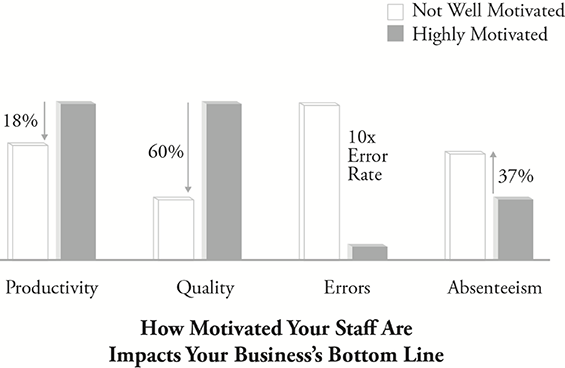
A study by Harter et al., encompassing 152 organisations and over 950,000 employees, highlighted the very real negative impact on a business when some staff are not well-motivated, or worse still, demotivated.
Their results indicated:
- An 18% decrease in productivity when compared with highly motivated staff
- A 60% decrease in quality, measured by defects in products
- A ten-fold increase in errors compared with errors made by highly motivated staff
- A 37% increase in the rate of absenteeism
Clearly, it is critical for business that you know how to motivate your team, and how to avoid demotivating them.
 Factors That Demotivate
Factors That Demotivate
1. Micromanagement
Micromanagers usually have very good intentions. They want to see consistently high-quality work being produced. However, their method for achieving this consistently high quality of work drives most people mad! Their constant questions, instructions and observations leave people feeling frustrated, untrusted or incompetent.
2. Too much ‘red tape’
When a business has too many rules and regulations, it can seem to some staff that some of the rules are there ‘just for the sake of it’. These rules can hinder the implementation of improvements and innovation, and over time people tend to stop suggesting new ideas or changes.
3. Lack of confidence in the business leadership
It is critical that staff believe that their manager and the CEO are highly competent. They don’t have to agree with everything their manager proposes and implements, they don’t even need to really like them. They do need to respect their competence and vision. They do need to believe that their manager and the CEO ‘walk their talk’ extremely well and that they lead by example.
4. Tolerance of mediocre performance
If it is obvious, or perceived, that some team members are performing at a mediocre level and that there are no consequences of this, most people will struggle to maintain their own high level of motivation and work performance, certainly in the long term.
5. Poor communication
Clear and frequent communication has a major positive impact on the business. People know what they are expected to do and why they are expected to do it, they hear about changes firsthand and close to the event. When the reverse happens and communication is not frequent and not clear, people start to make up their own stories about the situation. Rumours and gossip become commonplace and these have a negative impact on the work environment and motivation levels.
6. Difficult relationships with colleagues
According to Gallup research, good working relationships can boost employee engagement levels and motivation levels by 50%. Conversely, even when the work is stimulating and challenging, if we don’t enjoy the people we work with our motivation levels will drop and we will most probably look for alternative employment.
7. Job insecurity
When people sense that their company is struggling, they tend to start looking for a new job. This situation is understandable and probably can’t be prevented; however, you can slow the decrease in motivation level by communicating frequently and transparently with the team. This creates a sense of trust, and with that comes additional loyalty and commitment to completing tasks to a high standard as quickly as possible.
8. Boredom
Gen Y are known for seeking jobs that are stimulating and inspiring. They look for companies and roles where there is a strong element of variety, and a purpose that they believe in. Interestingly, employees from Gen X, Gen Y and the Baby Boomers all state that they best like a job that is personally fulfilling. Many of them are prepared to sacrifice some salary in order to have this type of job.
For your teams to be world class teams, achieving world class results, it is critical to have a strong emphasis on creating an environment in which individuals and teams are highly motivated. Only then can they achieve both high quantity and quality in their results, consistently.
If you want to improve your team’s motivation, get in touch to learn more about our ENGAGE FOR SUCCESS program – a dynamic two-hour workshop that teaches your leaders how to get the best out of their people, achieve high levels of performance with their team and high levels of job satisfaction for each team member. Call World Class Teams on 1300 085 248 or email info@worldclassteams.com.au.
.jpg)